It Looks Like Nouri Al-Maliki Has Lost The Kurds, Assuming He Ever Had Them
Iraq continues to fall apart.
Both inside and outside of the country, the general consensus among observers, analysts, and diplomats is that Iraqi Prime Minister Nouri al-Maliki’s best option for dealing with the ongoing threat from ISIS and other Sunni militants is to reach out beyond his base among Iraq’s Shiite community to the Sunnis and Kurds in order to form a more stable unity government. There have already been some signs that al-Maliki was not very amenable to following this advice, much less to the suggestion that he step aside in favor of a candidate that might be better able to unify the nation’s ethnic factions. To some extent, perhaps, one can understand the reluctance to reach out to the Sunni population given the ongoing fight, but one would think that strengthening relations with the Kurds in the north would seem to be a logical course of action. After all, the Kurds could provide material and men to fight ISIS, and that seems to be something that the Baghdad government could use at the moment. For a number of reasons, though, including quite prominently al-Maliki’s own actions, it doesn’t look like that will happen; and that could have serious consequences for Iraq’s future.
At the top of the list, we have the news that al-Maliki has ousted Iraq’s Kurdish Foreign Minister:
BAGHDAD — The dangerous struggle between the leadership of Iraq and the country’s Kurdish minority intensified Friday, as the Kurds seized two oil production facilities in Kirkuk Province and the prime minister announced that he was appointing a temporary replacement for the foreign minister.
The prime minister, Nuri Kamal al-Maliki, a Shiite, moved to replace the current foreign minister, Hoshyar Zebari, a Kurd, with Hussain Shahristani, a Shiite from Mr. Maliki’s bloc. Mr. Maliki was responding to a decision by Mr. Zebari and other Kurdish cabinet members to boycott cabinet meetings in protest of Mr. Maliki’s searing criticism of the Kurds this week.
In a televised address on Wednesday, Mr. Maliki charged that the Kurds were harboring Sunni militant opponents of the central government and were even allowing members of the group known as the Islamic State in Iraq and Syria, which swept through northern Iraq in June, to organize operations from Kurdistan.
The replacement of Mr. Zebari infuriated the Kurds, but it also appeared to solidify their resolve to move ahead with the constitutional procedure to select a new government, including a president, prime minister and Parliament speaker.
“With this step, the prime minister doesn’t leave any room for power sharing,” said Faleh Mustapha, who serves as the foreign affairs minister for the Kurdish regional government — a separate position from that of Iraqi foreign minister. “Had our ministers resigned from the government or if we had withdrawn entirely from the government, it would be different, but we are still participating in the political process,” he said.
In response, the Kurds are demanding that al-Maliki resign, and taking control of oil fields in their territory:
Iraqi Kurds have taken over two oil fields amid a growing dispute with the government in Baghdad, Iraqi and Kurdish sources say.
Kurdish peshmerga forces seized control of production facilities at the Bai Hassan and Kirkuk oil fields in the north of the country on Friday.
Kurdish MPs have also withdrawn from Iraq’s central government.
They did so after Iraqi Prime Minister Nouri Maliki accused the Kurds of harbouring extremists.
Kurdish forces have moved into areas of north-western Iraq abandoned by the Iraqi army during the advance of Islamist insurgents led by the Isis (Islamic State in Iraq and the Levant) group over the past month.
The Kurds have since declared plans to hold a referendum on independence in the areas seized, escalating tensions with Iraq’s central authorities.
In a statement on Friday, the Iraqi oil ministry condemned the seizure of oil refineries, adding that they expected Kurdish fighters to “support security forces in confronting terrorist groups rather than using the conditions to raid and occupy oil fields”.
Reuters news agency said a senior source within the Kurdistan Regional Government had confirmed the takeover.
The unnamed source said they had been “forced to act to protect Iraq’s infrastructure after learning of attempts by Iraq oil ministry officials to sabotage it”.
The two oil fields are said to have a combined daily output capacity of some 400,000 barrels per day, AFP quotes a ministry spokesman as saying.
The Kurdish minority in Iraq managed to establish an autonomous region in the north in 2005 after decades of political and military efforts to seek self-rule.
Kurdish officials, including Kurdistan Region leader Massoud Barzani, say they view independence of areas under Kurdish control as their right.
In the end, that Kurdish desire for independence, which has existed for decades and survived brutal attacks from Saddam Hussein over the years, seems like it may be too powerful to convince the Kurds that they have any interest at all in being part of a united Iraq. For them, this attack by ISIS likely seems like the perfect opportunity for them to establish if not de jure independence than essentially de facto independence from Baghdad. If that persists, then it’s hard to see how the rest of Iraq hold together.
Perhaps, as Ed Morrissey suggests, al-Maliki could have prevented all of this. It would have required him to supress his obvious instincts to act in favor of his fellow Shiites while pushing Sunnis and Kurds out of power and rounding many of them up as supposed threats to the government. At the same time, though, it would also have required the Iraqi minorities themselves to want to be part of a unified nation. As I’ve noted before, though, the idea of a united Iraq is a relatively new one in history and its not one that has been held together by anything other than an authoritarian ruler until Saddam’s regime fell in 2003. It was never clear at all if the Iraqi people would want that in a democratically elected regime. Recent events certainly seem to call the idea into doubt, and Jean MacKenzie suggests that perhaps its time for the world to accept the idea of a partitioned Iraq:
In 2007, Joe Biden, then a senator from Delaware, co-sponsored a measure calling for a federated Iraq, according autonomy to the various groups. As he wrote in an op-ed he coauthored with Leslie Gelb, president emeritus of the Council on Foreign Relations, “Some will say moving toward strong regionalism would ignite sectarian cleansing. But that’s exactly what is going on already, in ever-bigger waves. Others will argue that it would lead to partition. But a breakup is already under way.”
Biden’s resolution was widely pooh-poohed, and then-president Bush continued with the surge. For a while, things stabilized, at least on the surface. But the currents were always running underneath.
Peter Galbraith, former U.S. diplomat who acted as an advisor to the Kurdish government in 2003, also argued against keeping Iraq together by force.
In his own op-ed in The New York Times called “Make Walls, not War,” published in October 2007, he points to the value of some form of federalism.
Sunnis would never accept a Shiite-dominated state, he maintained, and the Kurds would insist on independence. All the money and time the US spent on training the Iraqi army would be wasted if the government in Baghdad continued to repress its Sunni minority.
“American training can make Iraq’s Shiite-dominated security forces more effective, but it cannot make them into neutral guarantors of safety that the Sunnis can trust,” he wrote.
His words seem prescient indeed given the widespread defection of Iraqi security forces in Mosul and elsewhere in the face of the ISIS advance.
“Let’s face it,” wrote Galbraith, “partition is a better outcome than a Sunni-Shiite civil war. There is, in any event, little alternative to partition. Iraq cannot be reconstructed as a unitary state, and the sooner we face up to this reality, the better.”
If the experts are right, then what is happening now seems to be the worst of both worlds: a Sunni-Shiite civil war and a de facto partition of the country.
“Some things cannot be undone,” said Mendelsohn. “The bad blood between Sunni and [Shiite] is becoming worse with every crisis. Maybe a few years ago there could have been a strong central government, but now the regions will demand much greater autonomy.”
No matter what the U.S. and other international actors try, there is no going back, he said. “We are not going to have the same Iraq even in the best of circumstances.”
There are, of course, a whole host of potential complications associated with the idea of a partitioned Iraq. As it is, post-Saddam Iraq finds itself at the mercy of a much more powerful Iran, to the point that al-Maliki made an open and blatant decision to side with Iran and its ally in Damascus in the Syrian civil war by allowing Iraqi air space to be used to transport men and material between Iran and Syria. An Iraq that is partitioned into Sunni, Shia, and Kurdish states would obviously be in a far weaker position vis a vis Iran. Indeed, it’s quite probable that an Iraqi Shiite state would essentially be an Iranian client state. Such a development would create significant problems for Saudi Arabia, Kuwait, and the Gulf States, obviously. The Sunni Iraqi state would likely be a continued source of trouble for Syria, perhaps even leading to a situation where the borders of Syria also start to fall into question. Finally, if the Kurds in Iraq finally achieve their goal of statehood there’s no telling what impact this will have on the Kurds in Turkey and Syria, although it is interesting to note that Turkey has been generally supportive of the idea of increased autonomy if not outright independence for Iraqi Kurds, perhaps in the hope that it will serve as something of a safety valve for the nationalism of their own Kurdish population. Beyond that, there would likely be a whole host of other consequences from Iraqi partition that we cannot forsee at this point, but it’s unclear if we can do anything to stop it from happening, or that we should even try.
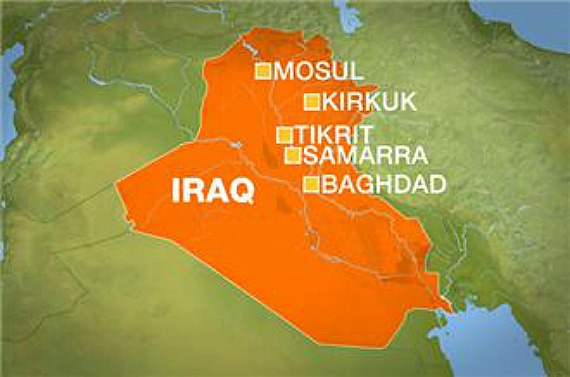

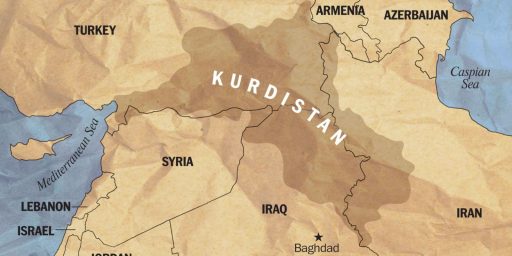
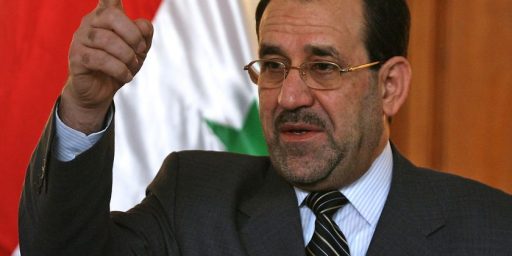
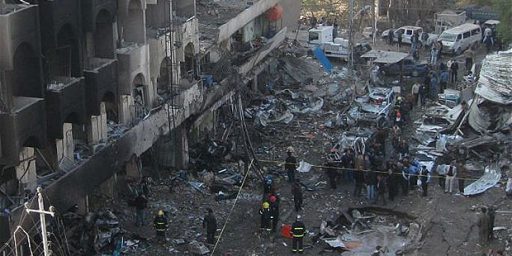
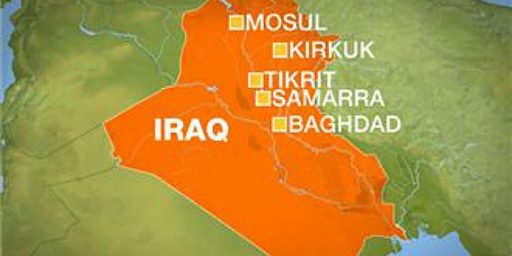
Iraq is not falling apart…it is simply becoming exactly what Joe Biden said it would become, years ago. Republicans just got in the way for a few years.
One again we are seeing the results of the Sykes–Picot line after the collapse of the Ottoman empire. The British and French were perhaps even more ignorant of the culture, religious and tribal nature of the Middle East than the Bush administration. Drawing lines on a map does not a country make. In truth al-Maliki, who lived in exile in Iran for 20 years, has always been a tool of the Iranians. Sunni Islam and Shea Islam are 2 entirely different religions and they have been fighting each other for over a thousand years. The Kurds are a bit different because while they are Sunni they are a separate ethnic group.
@Ron Beasley: I have not read a whole lot about the British role in the middle east, 1700 – 1900’s. Of course they understood the importance of the location, and overall did make an impact and progress to that area. (see General Allenby).
Whenever we happen to be out shopping and we run across an Ottoman, my mind wanders to the middle east, history lessons, desert oases, caravans, and flowing fountains. Since the Ottoman empire is long gone, I remind my relatives that the proper name is no longer an Ottoman.
/snark
Weak government–>self-organisation of groups–> ( )–> PROFIT!
Isn’t this supposedly the Libertarian ideal?
/endsnark
@Tyrell: Yeah, but calling a piece of furniture “bits of [list of countries] ” takes much longer to spell….
No matter how much good government would be helped by his departure, Maliki’s choices right now are stay put or go back to Iran. I bet he’d enjoy a London jet set lifestyle but it’s not on the table.
Alternately, one might be aware of the fact that the Kurds in Northern Iraq are themselves Sunni.
@grumpy realist:
Depends, can we describe North Korea as the progressive ideal on account of its strong centrally planned economy?
@Stormy Dragon:
Yes, but they generally identify themselves as an ethnic group separate from Iraqi Sunnis
@Tyrell: Here is a relatively good history of the Sykes–Picot Agreement although probably not perfect. The French and the British drew artificial lines in the sand to enhance their own empires and we are paying the price for that today. As I said above “Drawing lines on a map does not a country make.”
@Doug Mataconis:
Yes, but what does Nouri al-Maliki identify them as?
@C. Clavin:
Joe Biden was late to that party, Dick Cheney predicted this all the way back in 1994:
“Once you got to Iraq and took it over, took down Saddam Hussein’s government, then what are you going to put in its place? That’s a very volatile part of the world, and if you take down the central government of Iraq, you could very easily end up seeing pieces of Iraq fly off: part of it, the Syrians would like to have to the west, part of it — eastern Iraq — the Iranians would like to claim, they fought over it for eight years. In the north you’ve got the Kurds, and if the Kurds spin loose and join with the Kurds in Turkey, then you threaten the territorial integrity of Turkey.”
@Ron Beasley: “Drawing lines on a map does not a country make.”
Paging Joe Biden.
@J-Dub:
Sure…then Cheney went bat-shit insane…early onset alzheimer’s perhaps…and f’ed it all up.
@Tyrell: “I have not read a whole lot about the British role in the middle east, 1700 – 1900′s.”
If you want to amaze your friends, and make anyone from ISIS feel foolish, pay close attention to where the Sykes-Picot line is: It goes through Northern Iraq ISIS has engaged in hashtag politics calling for the End of Sykes-Picot, but a state comprising of Greater Syria (Syria and the Levant), plus Northern Iraq is actually the Sykes-Picot territory that France was assigned. They appear to be re-establishing Sykes-Picot.
Biden – regularly dismissed by the cool kids – was right about Iraq and right about Afghanistan. That’s a pretty good record.
It seems that whatever one’s reaction to the partition of Iraq may be, one should go ahead and have it. Because we are seeing the emergence of two new countries. And one of them, Kurdistan, gives the appearance of being the only well-governed region in the MidEast.
When borders are erased and re-drawn, however, much more than Iraq will be different. ISIS (the “Caliphate” that is unacknowledged by Muslims) is surely going to take parts of Syria as well as the ‘Sunni triangle’ and nearby. Kurdistan might well expand into Syria. Turkey has famously considered the Kurds to be desirous of taking slices of their landscape.
It’s going to be a wild ride if you happen to be in the area. The best we can hope is that ISIS becomes burdensome to it’s subject people and falls into decay quickly and that until then the crazy armed people roaming there are too busy killing each other to bother with us.
@michael reynolds:
Throw in the fiscal cliff negotiations…
Iraq does not need the KDP/KRG. Lets be honest, who needs a self proclaimed leader like Bazarni when he murdered over 10,000 of his own People with Saddam Hussein . We dont forget 1996 and Bazarni’s ways. Galbraith was paid for bieng a US diploamt, but helped himself to an share of a oil field and got $120 million for it while in Office for the US government. Hardly a professional and another of Bazarnis thieves. Throw in Jay Garner and you have another Thief and US Thieve while being paid by the US Military.
Lets wait and watch Turkey roll up Bazarni and then the Sunny Ba-athist Bazarni and Hawrami conspired with to take the oil fields.
The Kurdish people wont support Bazarni long term, they know his ways and despise him, he only as a power base in Arbil, nowhere else.
The PKK have already warned Bazarni for hiding ISIL in Kurdistan, the PKK will crush Bazarni as will the PUK when the fall out begins
ISIS, without oil, will create a poverty stricken little caliphate.
They want no part of a fight with the Kurds, who now control the oil in the north. The Kurds will not drop their weapons and run. They will fight for a cause they believe in.
@Stormy Dragon: It’s just that historically, small government has been associated with weak government (I only control that land around X), which means that anyone who has enough of an control force trotting behind him can grab whatever he wants.
Has a country run according to Libertarian principles EVER existed?! (and no, you don’t get to mumble about 11th century Iceland without explaining how that would scale up with population.)
It seems to me that the most “libertarian” example we’ve seen so far was Northern Italy up until the end of the Renaissance. Judging from history, the only reason you can ever get away with a small government in an area without someone else shoehorning in and taking over is a) there’s no one there, and b) no one wants the land.
Biden’s 2006 proposal was not separate countries but federalism:
@Ron Beasley: That was a feature and not a bug. It is why the British installed a Sunni as King in a majority Shiite country. Drawing lines on a map and empowering a minority helps keep the disparate groups of people from unifying against colonial rule and makes governance easier. The British weren’t dumb and employed this method of country making to divide tribes and ethnic lines all the time. A divided country cannot rebell as easily as a unified one. The enemy of your enemy is your friend, and the Brits mastered the divide and conquer method.
@grumpy realist:
Most libertarians are not anarchists. When they talk about weak government, they don’t mean in terms of its ability to monopolize the use of force, but rather what it does with that monopoly. To suggest that ethnic cleansing is what they mean when they talk about “self-organizing” is a ridiculous straw man.
@Stormy Dragon: ” To suggest that ethnic cleansing is what they mean when they talk about “self-organizing” is a ridiculous straw man.”
I agree. What they really mean is transferring all the nation’s wealth to the richest of the rich, and then letting them rule with no restrictions over everyone with less money. That is the ideal libertarian state — true freedom for whoever can pay the most for it.
@michael reynolds: don’t give him too much credit All the experts were saying the same thing – the only ones not were the assclowns in the WH
@wr:
That is not what most of them want, it is just the end state of things once they get what they want. Most of them realize this at some point in college and move on, just like most people infatuated with communism move on at that time.
@Doug Mataconis:
No. Not Iraqi Sunnis. Iraqi Arabs.
Iraqi Kurds (Sunni but also a splash of Shiite and non-Muslims) have come to consider themselves separate from the Arab population, Sunni or Shiite. And have a complicated relationship with the other ethnic groups (Turcomans, etc).
Blaming this all on the Sykes Picot line is too pat by far.
In any case, the naive assumption that the Kurds getting a nation state is resolution is off-base, ignoring severe internal ethno-linguistic divisions among the Kurds, minorities in their territories, etc.
Amusingly in this, in actual history, the Kurds collectively were part of the backbone of Sunni supremacy up until the end of the Ottoman period and the rise of language nationalism among the Turks and the Arabs. The bloodiest ethnic massacres of non-Sunni populations, Kurdish tribal militias…
@Dave D: wasn’t just the British that did this. Look at the Alawites in Syria. Or Rwanda, or countless other places.
BTW the other reason Turkey’s not so anti Kurdistan any more is of course – oil. They’re exporting oil to Turkey – see, eg http://mobile.todayszaman.com/business_iraqi-kurdistan-begins-pipeline-oil-exports-via-turkey_348480.html
Money is a great way to buy affection.
@Chris J: Well at least in your very interesting bit of fiction he’s not a gloomy Ba-athist, but a sunny one. One does has the Ba’s who are all gloomy about their athism.